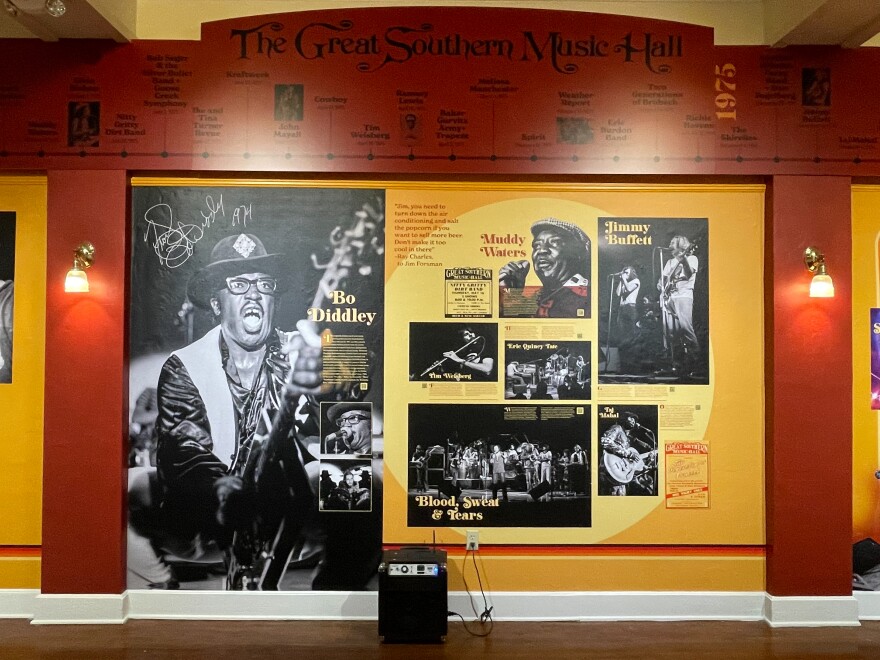The Florida Theater’s condition is one of dismal disrepair. The windows are perpetually dark and marred by graffiti, and it has not hosted a show in more than five years.
But an exhibit at the Matheson History Museum of Gainesville aims to illuminate the story of the site when it was among the most vibrant and popular venues in the region. That’s when it was called the Great Southern Music Hall.
The exhibit is called Return to Forever: Gainesville’s Great Southern Music Hall, and it commemorates the eponymous concert venue, which operated from 1974 to 1978. Hosting such well-known stars as Bo Diddley, Jimmy Buffett, Ray Charles, Muddy Waters, Bob Seger, Cheech & Chong, Steve Martin, Ike and Tina Turner, Randy Newman, Gregg Allman and many others, the Great Southern was the city’s premier venue of the era for music and other stage acts.
The display is also a celebration of the 1970s as a period in cultural history. It was designed and written by historians Rick Kilby and Bill DeYoung, and features the photography of John Moran, who worked as the Great Southern Music Hall’s house photographer while attending the University of Florida.
“Gainesville in the 70s was a magical place and a magical time, and we were awash in a mighty river of music,” said Moran, who has since achieved prominence as a nature photographer. “It was just really quite astonishing. It was the air that we breathe, the music was the soundtrack of our lives, and it was just such objectively outstanding music.”
Moran also emphasized the music’s special place in the overall cultural scene of the decade, referencing defining events such as the Vietnam War and the civil rights movement.
“The music wasn’t just objectively excellent. The music of the 70s was the leading edge of a cultural tsunami, and we all believed that it was taking us to a better tomorrow,” he said. “It was really heady times, and the music was what undergirded everything.”
During his time photographing performers at the venue, Moran said he developed an intimate style of photography that often involved getting so close he could’ve strummed their guitars himself. A photo he pointed out as particularly emblematic of his style featured blues singer Elvin Bishop, in which Moran held the camera so close that droplets of Bishop’s sweat splattered the lens. Another photo that showcased his creativity was a shot of the rock band Spirit, which was taken from the rafters of the theater’s ceiling.
“I lived for this,” he said. “It was such a joy, a labor of love for me.”
In addition to Moran’s photographs, the exhibit features other elements of multimedia such as a timeline of every performance at the Great Southern, images of contemporary promotional posters and relics such as Bo Diddley’s old guitar.
Kilby described how he used certain colors, such as deep reds and oranges, and other design elements to invoke the zeitgeist of the era and make the experience more immersive for visitors.
“I wanted to do something to evoke the feeling of the 1970s,” he said. “There was definitely a vibe in Gainesville during the 70s and I wanted to try and recreate that.”
Kilby, 57, grew up in Gainesville, and remembers experiencing that era as a child. He remembers wearing tie dye and peace symbols, and even recalls his parents talking about seeing shows at the Great Southern.
“It was really kind of funky. It was a weird time in Gainesville,” he said. “For me, I can kind of feel that time period come alive just by looking at the photographs and experiencing the exhibit.”
The exhibit was fully financed by Meldon Law, whose founder and owner, 78-year-old attorney Jeffrey Meldon, was also one of the founders of the Great Southern Music Hall, along with Jim Forsman. Meldon estimated that the total cost of sponsoring the exhibit came to about $50,000.
When Meldon and Forsman founded the Great Southern in 1974, their vision was to give Gainesville a venue that was more comfortable and state-of-the-art than anything else the city had to offer at that point. Meldon attributes their success running the venue to their ability to attract some of the most popular acts of the era.
“When you bring in good acts and you present a great show, the word gets out quickly,” he said.
He now looks back fondly on the thrills of an exhilarating period of his life and of Gainesville’s music scene.
“It was fast and exciting,” he said. “It was a vibrant time.”
Meldon also expressed hope that the exhibit may inspire someone to renovate and reopen the now-dilapidated site.
Those who were involved in the process of creating this exhibit consistently stated how important they believe it is for a place to maintain a strong connection to its cultural history. Kilby said this is especially true for a fast-growing city like Gainesville that also has such a rich artistic background.
“I think that’s an important story as Gainesville grows now, that you don’t want to lose those little vestiges of history, because that’s what gives a place character,” he said.
The Matheson, which is open from noon to 4 p.m. Wednesday through Saturday, plans to display the Return to Forever exhibit for at least a year.





